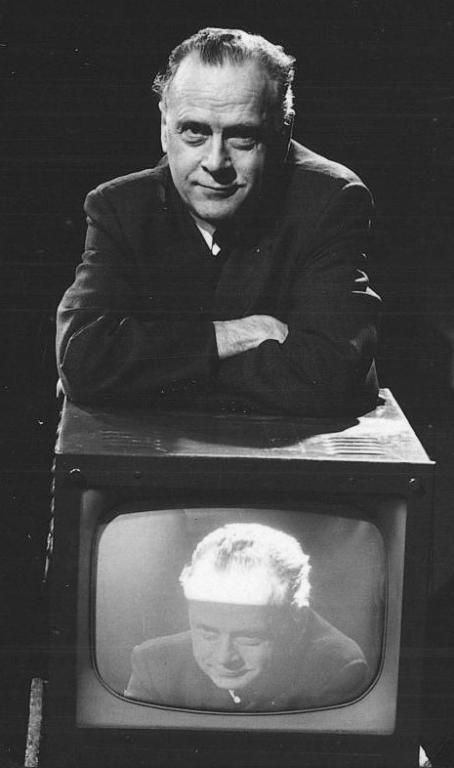Here at the Cranach blog we like to not only predict things but check our predictions, as in our New Year’s custom. The contrarian site The Free Press has started a custom of its own by highlighting every week a “prophet” whose predictions have come true. It starts off with a fascinating article by Benjamin Carlson on Marshall McLuhan.
As I remember well, back in the Sixties, McLuhan (1911-1980) became one of those “new thinkers” who created the impression that this is the dawning of the Age of Aquarius. His analysis of “media,” in particular the emergent electronic media, was so “mind-blowing” it was nearly psychedelic. It heralded a utopian future of a “global village” in which all humanity is connected, thanks to technology.
Never mind that McLuhan, a Canadian who taught for awhile at St. Louis University, was a devout conservative Catholic who wrote his dissertation on the Classical Trivium (available at the link) and decried many of the changes he saw coming.
I’d like to show you some of the passages that Carlson discusses. Keep in mind that when McLuhan analyzed electronic media he was mainly thinking of television and the telephone. He died in 1980, long before the internet and artificial intelligence were gleams in anyone’s eye. And yet he was saying things like this, from a television interview:
Everybody has become porous. They’ve got the light and the messages go right through us. By the way, at this moment we are on the air, and on the air we do not have any physical body. When you’re on the telephone, or on radio, or on TV, you don’t have a physical body. You’re just an image on the air. When you don’t have a physical body you’re a discarnate being. You have a very different relation to the world around you. And this, I think, has been one of the big effects of the electric age. It has deprived people, really, of their private identity. Everybody tends to merge his identity with other people at the speed of light. It’s called being mass man.
And now we have social media, virtual reality, and avatars! No wonder people are confused about their identity! No wonder the body doesn’t matter anymore for the transgendered, those for whom pornography replaces sex, and the spiritual-but-not-religious!
He also said this, underscoring that the “global village,” a term he coined, is not necessarily going to be a happy place:
Global village is not created by the motor car or even by the airplane. It’s created by instant electronic information movement. The global village is at once as wide as the planet and as small as a little town where everybody is maliciously engaged and poking his nose into everybody else’s business. The global village is a world in which you don’t necessarily have harmony. You have extreme concern with everybody else’s business. And much involvement in everybody else’s life.
Is there a better description of Facebook, Twitter [a.k.a., X], Instagram, TikTok, and the social media world in general?
And this, from his ground-breaking book Understanding Media:
Today, after more than a century of electric technology, we have extended our central nervous system itself in a global embrace, abolishing both space and time as far as our planet is concerned. Rapidly, we approach the final phase of the extensions of man—the technological simulation of consciousness, when the creative process of knowing will be collectively and corporately extended to the whole of human society, much as we have already extended our senses and our nerves by the various media.
This was first published in 1964! Sixty years ago, thirty years before the worldwide web, McLuhan foresaw “the final phase of the extensions of man” (cf. the singularity): “the technological simulation of consciousness.” That is to say, Artificial Intelligence (which McLuhan is careful to say is not consciousness but the “simulation of consciousness.”)
Carlson summarizes other prescient sections of Understanding Media:
In Chapter 32, “Weapons: War of the Icons,” he anticipates a form of meme warfare, where a battle of information and images take the place of most “hot” wars.
And in the last chapter, “Automation: Learning a Living,”he foresees that in a time of automation, “it is not only jobs that disappear, and complex roles that reappear,” but also whole specialized fields in education that vanish. The result, he writes with uncanny prescience, is a blending of work and leisure, the globalization of manufacturing, the monetization of information, a rise in self-employment, and a necessity to repeatedly retrain for skills in a career.
“It is a principal aspect of the electric age that it establishes a global network that has much of the character of our central nervous system,” he writes, thereby “enabling us to react to the world as a whole.”
That last part has me worried lest this be a prediction with a fulfillment yet to come. A central nervous system also has a controlling brain.
The global village in many ways, McLuhan suggested, will involve a reversion to a pre-literate culture and thus to different kinds of primitivism. So will the global village that is the entire world connected into a central nervous system of electronic media be ruled by a global monarch? Or an authoritarian technological collective that controls the world and does everyone’s thinking for them?
Photo by Gotfryd, Bernard, photographer – Marshall McLuhan, half-length portrait, standing, leaning on television set on which his image appears, Public Domain, https://commons.wikimedia.org/w/index.php?curid=119903792













